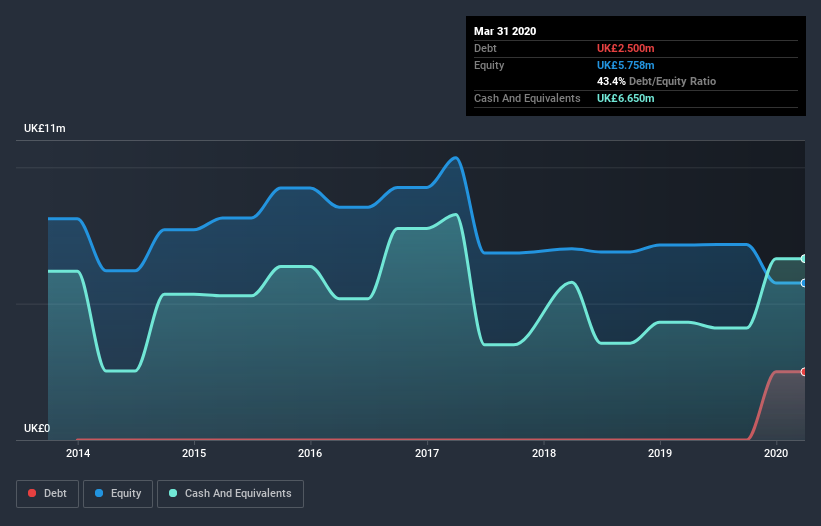We Think System1 Group (LON:SYS1) Can Stay On Top Of Its Debt

Howard Marks put it nicely when he said that, rather than worrying about share price volatility, 'The possibility of permanent loss is the risk I worry about... and every practical investor I know worries about.' So it might be obvious that you need to consider debt, when you think about how risky any given stock is, because too much debt can sink a company. We note that System1 Group PLC (LON:SYS1) does have debt on its balance sheet. But the real question is whether this debt is making the company risky.
When Is Debt Dangerous?
Debt and other liabilities become risky for a business when it cannot easily fulfill those obligations, either with free cash flow or by raising capital at an attractive price. In the worst case scenario, a company can go bankrupt if it cannot pay its creditors. However, a more usual (but still expensive) situation is where a company must dilute shareholders at a cheap share price simply to get debt under control. By replacing dilution, though, debt can be an extremely good tool for businesses that need capital to invest in growth at high rates of return. When we think about a company's use of debt, we first look at cash and debt together.
View our latest analysis for System1 Group
What Is System1 Group's Debt?
As you can see below, at the end of March 2020, System1 Group had UK£2.50m of debt, up from none a year ago. Click the image for more detail. However, its balance sheet shows it holds UK£6.65m in cash, so it actually has UK£4.15m net cash.
How Strong Is System1 Group's Balance Sheet?
Zooming in on the latest balance sheet data, we can see that System1 Group had liabilities of UK£5.18m due within 12 months and liabilities of UK£6.34m due beyond that. Offsetting this, it had UK£6.65m in cash and UK£5.09m in receivables that were due within 12 months. So these liquid assets roughly match the total liabilities.
Having regard to System1 Group's size, it seems that its liquid assets are well balanced with its total liabilities. So while it's hard to imagine that the UK£15.5m company is struggling for cash, we still think it's worth monitoring its balance sheet. Succinctly put, System1 Group boasts net cash, so it's fair to say it does not have a heavy debt load!
The modesty of its debt load may become crucial for System1 Group if management cannot prevent a repeat of the 20% cut to EBIT over the last year. Falling earnings (if the trend continues) could eventually make even modest debt quite risky. The balance sheet is clearly the area to focus on when you are analysing debt. But it is System1 Group's earnings that will influence how the balance sheet holds up in the future. So when considering debt, it's definitely worth looking at the earnings trend. Click here for an interactive snapshot.
Finally, a company can only pay off debt with cold hard cash, not accounting profits. System1 Group may have net cash on the balance sheet, but it is still interesting to look at how well the business converts its earnings before interest and tax (EBIT) to free cash flow, because that will influence both its need for, and its capacity to manage debt. Over the most recent three years, System1 Group recorded free cash flow worth 64% of its EBIT, which is around normal, given free cash flow excludes interest and tax. This cold hard cash means it can reduce its debt when it wants to.
Summing up
While it is always sensible to investigate a company's debt, in this case System1 Group has UK£4.15m in net cash and a decent-looking balance sheet. So we don't have any problem with System1 Group's use of debt. When analysing debt levels, the balance sheet is the obvious place to start. However, not all investment risk resides within the balance sheet - far from it. Be aware that System1 Group is showing 4 warning signs in our investment analysis , and 2 of those shouldn't be ignored...
At the end of the day, it's often better to focus on companies that are free from net debt. You can access our special list of such companies (all with a track record of profit growth). It's free.
This article by Simply Wall St is general in nature. It does not constitute a recommendation to buy or sell any stock, and does not take account of your objectives, or your financial situation. We aim to bring you long-term focused analysis driven by fundamental data. Note that our analysis may not factor in the latest price-sensitive company announcements or qualitative material. Simply Wall St has no position in any stocks mentioned.
Have feedback on this article? Concerned about the content? Get in touch with us directly. Alternatively, email editorial-team@simplywallst.com.

